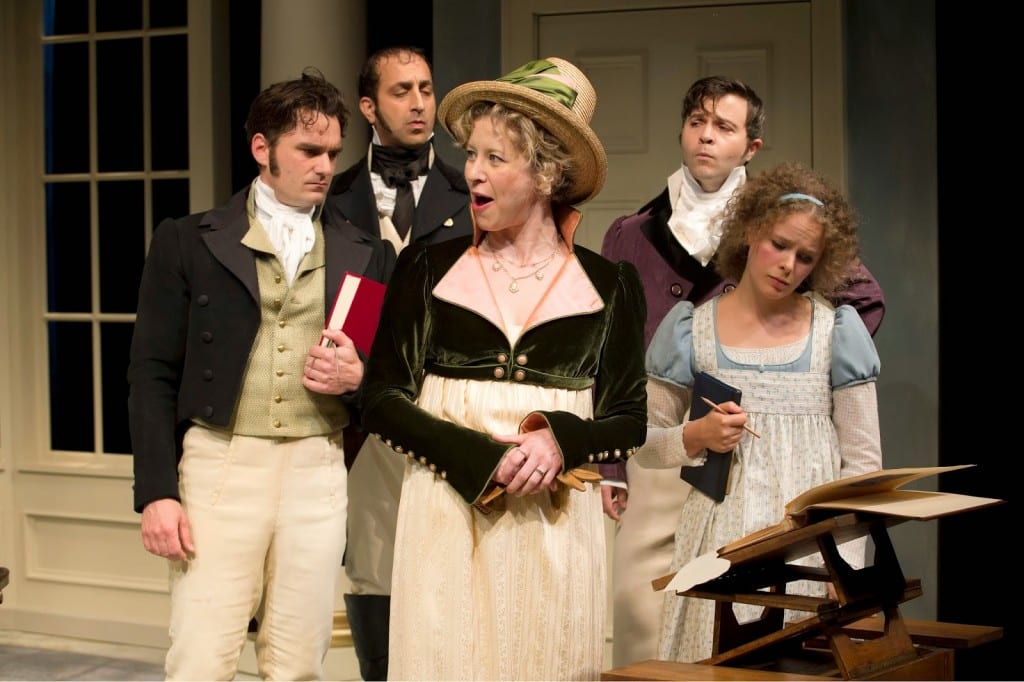Tom Stoppard’s Arcadia is arguably about the nature of genius (among other things), but sadly the genius in tonight’s production, with a few exceptions, remained largely in the script and not on stage. I’ll readily admit that my expectations are high. I first saw Arcadia in Trevor Nunn’s magnificent Lincoln Centre production with unforgettable performances by Billy Crudup, Blair Brown, Robert Sean Leonard, and Victor Garber (to name a few). This performance was breathtaking; harrowing and triumphant at the same time, it left my younger self emptied, awed and in tears at the end. While I do not expect to be transfixed as I was twenty years ago, Eda Holmes’ Shaw Theater production, which has been feted for two years now, promised to bring all the magic of a great play in stellar performance to the Toronto stage. It was a significant disappointment to discover a piece that was, in almost every sense, average.
Arcadia is such a densely cerebral play that it demands absolutely honest performances that can temper wit with the complexity and tenderness of a flawed human spirit. With the exception of a few, tonight’s performances were full of an empty precision that demonstrated an almost hammy projection of character, a reduction of complexity to stereotype. The rather classical design was unobtrusive but hardly inspired, and occasionally lapsed into the ridiculous with props that looked like they had been picked out of somebody’s nursery toy closet. Costumes were at times incongruous and distracting, suggesting a vague attempt at projecting versions of the two periods (contemporary and regency) rather than a coherent well researched portrait of two ages. These little slips, on the whole, amounted to a sense of carelessness which seemed somewhat incongruous given the central preoccupation with precision that is at the heart of Arcadia.
What saved the day was Kate Besworth’s incandescent performance as Thomasina Coverly. Ms Besworth is surely the master of that uncanny alchemy in which a grown woman can suddenly appear to be 13, or 16. Indeed this performance perfectly captured the contradictions between Thomasina’s fragile burgeoning femininity, and her fearsome intellect; she was that rare 16 year old who stops you dead in your tracks with some profoundly original observation about the nature of things, and can in the same moment demand rice pudding. Beside Ms Besworth, as Septimus Hodge, tutor to Thomasina, was Gray Powell who was the very epitome of the romantic scholar gentleman. Mr. Powell has that rare ability to bring wit and depth to a performance which could very easily dissolve into a caricature of a Darcy-esque romantic hero. The gentle rhythm of these two performances perfectly captured the dance in which this man and this young woman approach their final revelation, a kiss that reveals everything there is to know about life, the universe, chaos theory, entropy, and all such mysteries.
Sadly, the only other performance that approached this tenor, was Martin Happer’s acerbic and understated Valentine Coverly. Mr Happer shifts mercurially between laugh-out-loud comic delivery and a bookish sexiness that is perfect for the self doubting Valentine. Sadly, Dianna Donnelly as Hannah Jarvis was consistently strident, her dialogue with Patrick McManus’s distractingly flamboyant academic Bernard Nightingale running more like a Punch and Judy show than a barbed battle of wits. Harveen Sandhu’s Chloe Coverly looked and sounded like she had stepped off an end-of-term high school play. Such performances disappoint an audience who sits before you waiting to be transported by the magic that only you can bring into being. After all, the play’s the thing.

